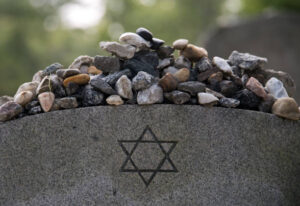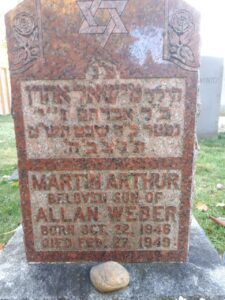
Remembrance stones left on a Jewish grave
There is a time for everything, and a season for every activity under the heavens:
A time to be born and a time to die.
Abraham wished to buy a grave for his wife, Sarah. The demand for the land was a highly inflated price of four hundred silver sheckels.
Have we not learned?
Death is the last mitzva; the last rite. It should never be a profit-making business.
In Judaism there are some things, like abortion, that are considered legal, but not necessarily moral.
I have had the unwanted opportunity to find out how mean-spirited and immoral the death industry can be. I know that these predatory practices are not limited to the Jewish world. I doubt I am the only one who has faced such immorality. We are all vulnerable when faced with death of loved-ones.
Sadly, today, too many “choose” cremation because of the cost!
Jewish law and tradition consider cremation as destruction of property. Jewish law (“Halachah”) is unequivocal that the dead must be buried in the earth. Jewish mysticism, or Kabbalah, also holds that the soul does not immediately depart the body. Rather, it slowly leaves the body as it decomposes; cremation therefore is considered to cause pain, even after death. Yet, it seems that cremation is growing in the Jewish world. It seems cost is a contributing factor.
“Jewish funeral directors do report anecdotally to The Forward magazine that although small compared to the rest of society, the numbers of Jews choosing cremation are up across the country.
Information is spotty, and varies from city to city, but funeral directors in Philadelphia and New York stated to the Forward that the rate of people opting for Jewish burial of cremated remains are as high as 10 – 14%.”
Too often I see memorial pages on line to help families pay for burial expenses. There are commercials for death insurance so your family can afford to bury you! This is outrageous. No matter your religion or belief system.
A parent dies. You know she wants to be buried beside her baby brother in an old cemetery where few now go to rest. She loves the brother she never met. His death at two and a half led to her birth. She always believed that she carried his soul within her and that she lived for two people.
Her family calls the person responsible for the cemetery to purchase the plot for the burial the next day. And he says over the phone, well that will be $18,500 dollars. The reason? Well the price of real estate has gone up.
This story is true. But I called for myself. I am the parent still alive, looking to be buried by my brother in the cemetery where he and our father’s parents are buried.It is the the Machziki Hadas Congregation (“the MHC”), formerly known as the Bay Street Synagogue which was built in 1895 and taken down in 1970. Roselawn Avenue Cemetery is located in Toronto. Opened in 1906 by Samuel Weber. Wonder how much the land cost back then. Please note my maiden name is Weber. And I wish to be buried beside my brother, Martin Arthur Weber who died in 1949 and be with my paternal grandparents whose graves seem to be some of the earliest in the cemetery: my grandfather in 1934 and my grandmother, for whom I am named, in 1940.

One would think this wish would not be difficult to fulfill. But it is. Over the years when I have called about buying the plot the price has gone from $8000.00. Then it was $13,000 and the last time, it soared up to $18,500. I was informed the reason for the price increase was the rise in the cost of real estate. For comparison, one of the largest Jewish cemeteries in the Toronto area sells plots for $4-6 thousand. While another one sells them for $12,000.
Later I was told that one needed to have interment rights set aside solely for members and affiliates of the synagogue. But the synagogue was closed in the 1970’s. And if I needed interment rights, why did the “licensee” offer to sell me the plot in the first place.?
It is not cheap to die.
According to one Association who has purchased plots for their members in another location: “No monies from the sale of interment rights (cemetery lots) are for profit; interment rights are sold to members at the cost originally paid by the Association. These monies simply recover the Association’s initial payment for the interment rights to the cemetery lot.” What was the initial price for the land in 1906 where my brother rests and the plot beside him?
Why is this not common practice?
I reached out to our Jewish community organizations. I had read about the takeover of a cemetery just north of my brother’s cemetery. The person in charge of it said there was little he could do. Seems no one is responsible for overseeing the running of our Jewish cemeteries. We have so many Jewish organizations, people getting paid to do I don’t know what, but no one to oversee the burial grounds or rites of our relatives.
I reached out to the people who run my family’s cemetery with a series of questions about the running of the cemetery. I didn’t hear back.
I ended up contacting the BAO; the Bereavement Association of Ontario. A non-Jewish organization that oversees the running of cemeteries to learn more about the business of death, for that is what it has become.
I discovered that the Funeral, Burial and Cremation Services Act of 2002 has rules regarding the price of plots.
33 (1) Every operator shall maintain a price list of the licensed supplies and services that are provided by the operator in accordance with the regulations. 2002, c. 33, s. 33 (1).
Price list available to public.
(2) Every licensee shall make the price list maintained under subsection (1) available to the public in accordance with the regulations. 2002, c. 33, s. 33 (2).
Prohibition: exceeding listed price
34 (1) No licensee shall charge, collect or receive any amount of money for a licensed supply or service that is more than the price indicated on the price list maintained under section 33. 2002, c. 33, s. 34 (1).
Over the years that I asked about the plot, I was never shown a price list. Mind you, it never occurred to me to ask.
There are guidelines for a perpetual care cemetery. Great. But how does one know if the cemetery follows those guidelines? And if not, then what?
Suffice it to say, after 5 months of back and forth bafflegab with the BAO, I was told there are no restrictions on the price of a plot despite their myriad of rules.
Hmmm.
This Rabbi was well-acquainted with the “trustee” of the cemetery as well as his family. I thought he should have recused himself and ask another Rabbi to oversee my complaint. But, no.
He then told me that there are no “laws” regarding the cost one can charge for a plot of land. What?
“The Torah states (Exodus 21:1), “Ve’eleh ha-mishpatim asher tasim lifneihem,” “And these are the statutes which you shall place before them.” The Talmud (Gittin 88b), sensitive to the word “lifneihem”, deduces “lifneihem- velo lifnei akum,” “Before them- but not before gentiles.” As such, the Talmud understands that there is a prohibition against bringing disputes to be adjudicated before gentile courts.1. The rationale for such a prohibition is explained by Rashi who writes that one who goes to secular courts “profanes the name of God and gives honor to the name of idols.”2. Rambam writes that one who does so is considered as if he has “blasphemed and raised a hand against the Torah of Moses.”3. The unanimous conclusion among halachic authorities is that the prohibition extends to even those gentiles who are not technically idol worshippers.4. Acceptance of a foreign court system, even if secular in nature, is considered a rejection of Torah law. The Shulchan Aruch emphasizes the seriousness of this prohibition by describing one who violates it in unusually harsh terms. One who goes to secular court is considered “an evildoer, as if he has blasphemed, and as if he has raised a hand against the Torah of Moses.” The Shulchan Aruch also states that the prohibition applies even in a situation where the secular court would rule according to Jewish law and in a case where both litigants agree to go to secular courts.5. As a result of this unequivocal prohibition, one who wishes to adjudicate a private legal dispute with a Jewish adversary generally must do so in the confines of a beit din.”
From the Ethics of the Fathers: “Rabbi Tarfon used to say, it is not incumbent upon you to complete the task, but you are not exempt from undertaking it.”


